

Today’s Weather
UF Soulfest brings international dance, music to the stage
Sabor Latino Dance Team took home top prizes
By Leona Masangkay Alligator Staff Writer
Dozens of students danced and sang on stage under colorful lights on the evening of Oct. 10 in the name of homecoming spirit and school pride.
With matching cream-colored suits and dazzling smiles, hosts Elijah Sherman and Marco Salvador welcomed over 300 students to the Reitz Union Grand Ballroom for Soulfest, a multicultural talent show performed every year to bolster school spirit the week before homecoming.
Students enjoyed nine performances, complimentary food and hands-on craft activities.
Sherman and Salvador cracked jokes as they introduced acts and mimicked dance moves or singing after performances concluded, prompting the crowd to respond with amused laughter and applause.
The acts included cover songs, original performances and intricate dance routines. Performers bathed in vivid lighting as they took the stage.
The Sabor Latino Dance Team took home prizes for group and overall performance for its highspeed routine to a mix of Latin music. Adara Gaston, a soloist who combined tap dance and hiphop to a Beyoncé mix, won the event’s solo prize.
The event kicked off with UF Anisong Ensemble, a student music group known for covering anime songs as live music. The group performed one of the theme songs from “Jojo’s Bizarre Adven-
ture” with a live singer and band.
Up next was the Danza Dance Company, a student group that danced to a mashup of upbeat, energetic songs. The dancers commanded the stage in matching green, white and pink costumes and used quick, sharp movements throughout the routine.
The crowd clapped and cheered in support of the group. Some audience members expressed personalized support for members by holding a large cardboard cutout of one of the dancer’s faces.
The Elite Chompettes, UF’s first majorette dance team, performed in a routine combining hip-hop and country genres to a Doechii mix. The girls donned cowgirl outfits and incorporated the famous “Andy’s coming” line from Disney’s “Toy Story” to freeze midmovement and demonstrate motor control.
Other performances included two solo vocalists, Jillian McKinney and Ashiana Ndandou, and a dance number by student-run group Floridance.
National Pan-Hellenic Unity Step’s performance concluded Soulfest and ended the evening with raging support from fraternity and sorority members who came out to support their brothers and sisters.
Angel Peter, a 21-year-old UF data science senior, came to cheer on a friend performing in the Unity Step.
The step group performed a routine highlighting seven of UF’s nine traditionally Black fraternities and sororities. Students representing each organization took turns
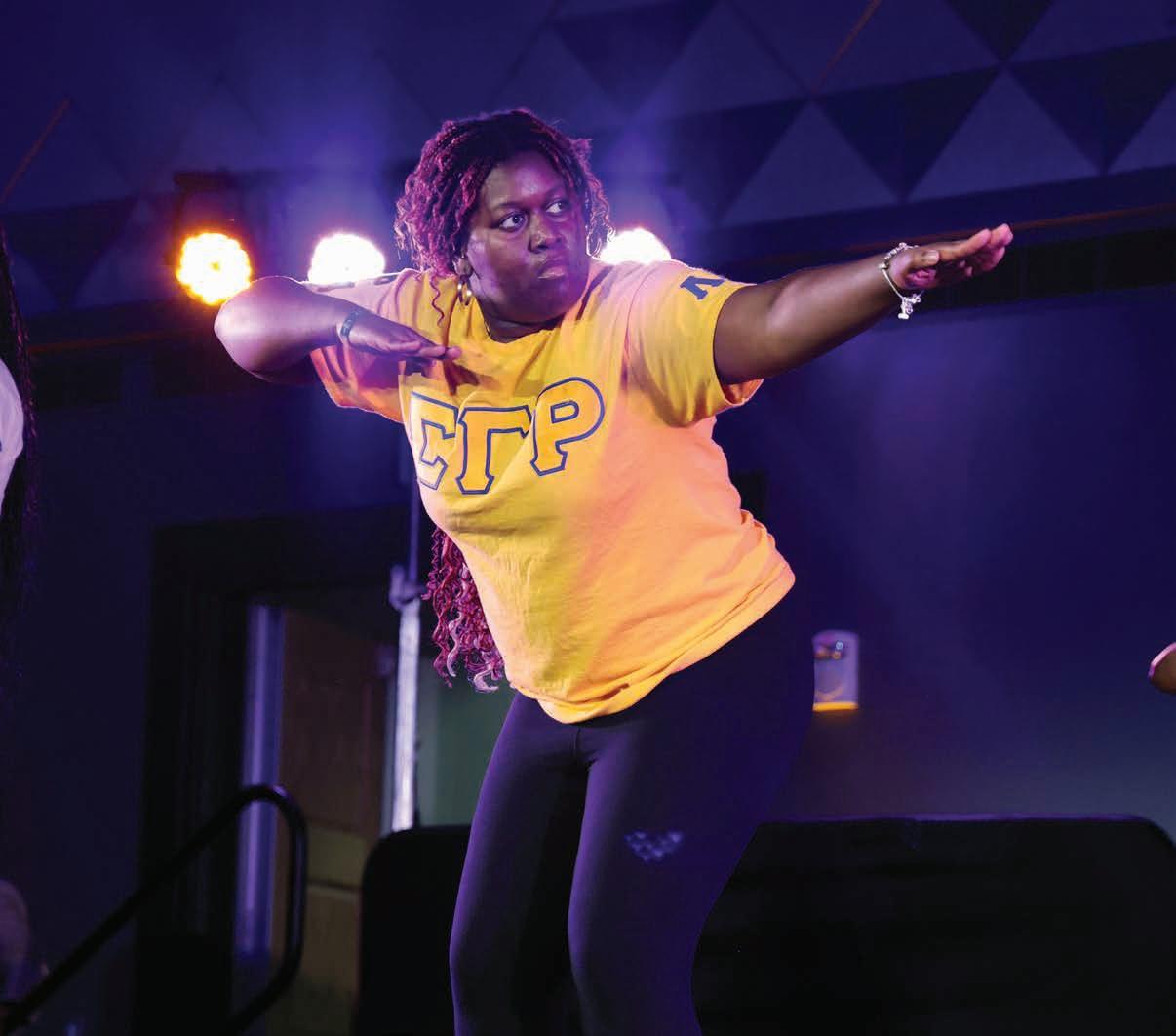
performing a routine combining foot stomps with hand claps to create intricate rhythms. The performers stood in a moving circle formation to spend time showcasing each fraternity and sorority individually.
Peter’s friend did a backbend into a split during the performance while wearing heels, which Peter found impressive. Each act of the evening had their own flair, she added, which was cool.
“I thought [it] was incredible and show-stopping,” Peter said.
When Sabor Latino was crowned the evening’s winner, the team cheered and jumped with excitement. Gaston joined them on stage after she was crowned the solo champion, smiling while accepting her award.
With heavy anticipation, the crowd waited for the overall winner to be announced.
As soon as Sabor Latino’s name was announced, the ballroom erupted in cheers. Members of the dance team embraced each other on stage and beamed as they accepted their second trophy of the evening. The group secured the prize for the second year in a row, having been Soulfest champions last year.
Sabor Latino has an indescribable element that many clubs lack, said Yisselle Rojas, a 20-year-old UF health education junior on the team. She said the group feels like a family.
“I’ve been on multiple dance teams before, also cheer teams, and the ambiance is just very different,” she said.
Before she knew the winning results, Sabor Latino dancer Livia Bellon said all of the group’s efforts would be worth it, even if it didn’t win.
After Sabor Latino won group and overall champion titles, Bellon said she felt like all of the group’s hard work had paid off.
“I’m really proud of my group and of all of the other groups too,” the 18-year-old UF anthropology sophomore said. “Everybody’s so talented and so dedicated, and it’s great, and I look forward to more experiences like this.”
Soulfest is one of the first events preceding UF’s homecoming. The homecoming festival and parade, Gator Gallop and Gator Growl will take place Oct. 17. On Oct. 18, UF will face off against Mississippi State for its homecoming game.
@leo_amasangkay lmasangkay@alligator.org

Editor-In-Chief
Engagement Managing Editor
Digital Managing Editor
Enterprise Editor
Metro Editor
Alissa Gary, agary@alligator.org
Zoey Thomas, zthomas@alligator.org
Sophia Bailly, sbailly@alligator.org
Shaine Davison, sdavison@alligator.org
Megan Howard, mhoward@alligator.org
Opinions Editor
University Editor El Caimán Editor
Sports Editor
Assistant Sports Editor
Multimedia Editor
Assistant Multimedia Editor the Avenue Editor
Editorial Board
DISPLAY ADVERTISING
Advertising Office Manager
Sales Representatives
Sales Interns
CLASSIFIED ADVERTISING
Maria Avlonitis, mavlonitis@alligator.org
Corey Fiske, cfiske@alligator.org
Juliana DeFilippo, jdefilippo@alligator.org
Vera Lucia Pappaterra, vpappaterra@alligator.org
Luke Adragna, ladragna@alligator.org
Amanda Roman, aroman@alligator.org
Sydney Johnson, sjohnson@alligator.org
Noah Lantor, nlantor@alligator.org
Copy Desk Chief Pristine Thai, pthai@alligator.org
Alissa Gary, Zoey Thomas, Sophia Bailly, Pristine Thai, & Corey Fiske
352-376-4482
Cheryl del Rosario, cdelrosario@alligator.org
Paige Montero, Simone Simpson, Jasmine Chavez, Andrew Han, Makenna Paul, Sofia Korostyshevsky, Lilly Schneider, Ashley Demir, Daniel Sanchez
Angelina Rota-Ono, Juliana Arbelaiz, Sofia Morales-Guzman, Mixtli Huerta, Lara Baran, Alessandra Puccini
352-373-3463
Classified Advertising Manager Ellen Light, elight@alligator.org
BUSINESS
352-376-4446
Comptroller Delia Kradolfer, dkradolfer@alligator.org
Bookkeeper Cheryl del Rosario, cdelrosario@alligator.org
Administrative Assistant Ellen Light, elight@alligator.org
ADMINISTRATION
352-376-4446
General Manager Shaun O'Connor, soconnor@alligator.org
President Emeritus C.E. Barber, cebarber@alligator.org
SYSTEMS
IT System Engineer Kevin Hart
PRODUCTION
Production Manager
Namari Lock, nlock@alligator.org
Publication Manager Deion McLeod, dmcleod@alligator.org

The Independent Florida Alligator is a student newspaper
member of the Newspaper Association of America, National Newspaper Association, Florida Press Association and Southern University Newspapers.
The Alligator strives to be accurate and clear in its news reports and editorials. If you find an error, please call our newsroom at 352-376-4458 or email editor@alligator.org 352-376-4458 NEWSROOM:
Leona Masangkay // Alligator Staff
Members of the National Pan-Hellenic Council’s sororities and fraternities step during the NPHC Unity Step at Soulfest in the Reitz Union on Friday, Oct. 10, 2025.
State commissioner visits, scolds Alachua County School Board
COMMISSIONER ANASTASIOS KAMOUTSAS ADDRESSED TINA CERTAIN’S FACEBOOK POST
By Logan McBride Alligator Staff Writer
The Alachua County School Board shared updates on teacher salary negotiations and heard remarks from a state education commissioner during the Oct. 7 meeting.
State Commissioner joins meeting
The school board had a special guest at its meeting — Florida Commissioner of Education Anastasios Kamoutsas.
Kamoutsas’ visit followed the Florida State Board of Education’s decision to summon Tina Certain, vice chair of the school board, during its Sept. 24 meeting due to a social media post she made about Charlie Kirk’s memorial.
“How a 31yr old uneducated white boy has been glorified,” Certain wrote in a Facebook post. “To see the feds & state elevate him angers me.”
During his remarks, Kamout-
sas said he was “outraged” by the board’s actions and accused members of not prioritizing students.
“Glorifying a school shooter, that is a terrible example for our youth,” Kamoutsas said. “Why are you not prioritizing your students? Instead, your public service is about yourself and your selfish acts.”
Kamoutsas said the state will continue to monitor the Alachua County School Board until it ensures every student and employee is treated with respect and dignity.
“I’m determined to change the culture of intimidation and neglect of duty here in Alachua County,” Kamoutsas said.
His comments were met with some applause.
Jane Spear, an 80-year-old Gainesville resident, urged the board not to yield to pressure from the state. The board should protect employees and students within the county, such as Lauren Watts, who may have her teaching license revoked after giving a student a “most likely to become a dictator” superlative, Spear said.
“Let’s keep doing the right thing by not caving in to those with a strong political agenda,” Spear said.
Other public commenters criti-
cized the board’s recent actions. Tim Martin said free speech comes with consequences, and the district’s teachers and staff bear the impact of the board’s behavior more than anyone else.
The board has faced scrutiny from the state for almost three months. In July, Chair Sarah Rockwell received backlash for comments she made on Facebook about the death of professional wrestler Hulk Hogan.
“Oh, did Hulk die? I didn’t even know. Good. One less MAGA in the world,” Rockwell wrote in the deleted Facebook post.
A parent later demanded Rockwell’s resignation during public comment at a July 31 meeting, which Tina Certain recessed after arguments broke out.
The State Board of Education ruled at an Aug. 20 meeting the Alachua board violated the parent’s First Amendment rights by calling for a recess and vowed to continue monitoring its proceedings.
Certain addressed Kamoutsas’ comments later in Tuesday’s meeting. She clarified she posted about Kirk on her personal Facebook page, not the one she uses for district information. The post reflected her
individual opinion and aligned with the First Amendment training board members received, she said.
“I felt that I made it because I do have a First Amendment right,” Certain said. “Some folks may agree with it, some folks did not agree with it, but those are my feelings.”
Certain is scheduled to appear before the State Board of Education at its next meeting on Nov. 13 in Crawfordville, Florida.
Board offers employee union updates, evaluates cell phone policies
The board received updates from the Alachua County Education Association, the county’s employee union.
The board’s and union’s bargaining teams have come to a tentative agreement on salaries for this school year, said ACEA President Carmen Ward. The teams are evaluating language this month to increase employee pay.
Ward said the county’s teachers are consistently overworked, and their collective bargaining agreement isn’t properly enforced.
For example, teachers are summoned to open houses multiple times
per semester, despite their collective bargaining agreement only calling for one open house each semester, she said.
“Our teachers are overburdened,” Ward said. “It is almost pandemiclevel crisis in our district right now with teachers not having enough time to do their job.”
The school board also approved all its action items during the meeting, including a cellphone policy for students.
Under the policy, elementary and middle school students are not allowed to use phones during the school day. High school students are only permitted to use them during classroom instructional time if given instructors’ permission. Otherwise, students should have devices powered off and stored out of sight.
Additionally, the school board’s consent agenda passed unanimously, including school improvement plans, which provide a needs assessment, grade level data review and budget for individual schools in the county.
The school board will meet again Oct. 21.
@logandmcbride lmcbride@alligator.org
UF Board of Trustees’ universities under federal fraud investigation
JAMES
W. HEAVENER
IS THE CEO OF FULL SAIL UNIVERSITY AND LOS ANGELES FILM SCHOOL
By Maria Avlonitis & Swasthi Maharaj Alligator Staff Writer
UF Trustee James W. “Bill” Heavener has been accused of defrauding the government.
A federal court case in California alleged Full Sail University in Winter Park, just north of Orlando, and Los Angeles Film School, both of which Heavener operates, defrauded the government of tens of millions of dollars over the past decade by inflating job placement numbers to continue receiving federal financial assistance.
The complaint alleges the institutions have funneled money to employers to hire recent graduates for jobs that lasted less than a week. That way, the colleges would hit a 70% employed threshold after graduation to qualify for more federal funding. The complaint was filed last year in federal district court, according to Republic Report.
Full Sail receives over $377 million per year in federal funding, according to the complaint. LAFS receives over $85 million per year in federal financial assistance, including student loans and veterans’ financial aid funds.
UF spokesperson Cynthia Roldán declined to comment on the allegations. Heavener did not respond to several emails for comment.
David Phillips, LAFS’s former vice president of career development, and Ben Chaib, the school’s former vice president of admissions, filed the case. They claimed Heavener and Diana Derycz-Kessler, the former president and CEO of LAFS, gave direction and were in extensive contact for the “fraudulent schemes described.”
They alleged “the vast majority of LAFS graduates were not able to obtain entry level positions” in the movie industry. The complaint quotes an internal document stating that “most [grads] report a yearly income of 0-$5,000 in their field of study” to meet the employment threshold requirements.
The lawsuit discussed only what Phillips and Chaib believe to be activities at the LAFS, the statement read. It associated the
lawsuit with Full Sail through the institutions’ affiliation.
LAFS did not respond to multiple calls for comment.
In an email statement to The Alligator, Full Sail administration wrote the school did not engage in the improper conduct described in the complaint.
“These two individuals never worked at Full Sail university, and it is both inappropriate and offensive that they decided to include Full Sail in their litigation,” Full Sail wrote.
The complaint claims Full Sail and LAFS are “linked so tightly that LAFS’ accounting and paychecks are issued from within the [Full Sail] Winter Park, Florida offices.”
Phillips and Chaib argued the schools’ operations, despite being separated across two coasts, were in close contact and that Heavener coordinates fraudulent activities at both locations.
Heavener has been on the UF Board of Trustees since 2013 and is the CEO of The Heavener Company.
He serves as a Director of the Davey O’Brien Foundation and serves on the Board of the Tim Tebow Foundation, University of Florida Alumni Association and
the UF Foundation. He won a Lifetime Philanthropist Award in 2018.
The James W. “Bill” Heavener Football Training Center was named after him because of the financial contributions he made to the center. Heavener has donated about $1.2 million to the Republican Party over the course of 18 years.
The complaint alleges Heavener said there weren’t jobs for LAFS graduates.
“Full-time jobs don’t exist for these people, they don’t exist,” he said during an audit visit in 2017, according to the complaint.
According to its website, Los Angeles Film School offers degrees in animation, film production, media production and other related fields. Its tuition ranges from $5,250 to $15,500 per semester.
Full Sail University offers degree programs aimed at students interested in entertainment media and emerging technologies. The average tuition ranges from $70,000 to $90,000.

Local hunters, conservationists anticipate Florida’s black bear hunt
OVER 160,000 APPLICATIONS WERE SUBMITTED FOR THE DECEMBER HUNT, BUT NOT ALL ARE FROM HUNTERS
By Sofia Bravo Alligator Staff Writer
In October 2015, Adam Sugalski stood at a check station in Lake City, Florida, and counted each dead Florida black bear brought in from the city’s hunt. The statewide hunt was called off after just two days, when hunters harvested bears more quickly than anticipated.
Now, a decade later, Sugalski finds himself in the same position.
In August, the Florida Fish and Wildlife Conservation Commission approved a three-week black bear hunt from Dec. 6 to Dec. 28, the first since 2015. The commission accepted applications in September for a random permit lottery, unlike in 2015, when anyone who wanted a permit was guaranteed it.
The FWC began controlling the black bear population through regulated hunts in the 1930s but discontinued the practice in 1994. In 2015, it brought the hunt back for one year before cancelling it again.
Animal activists worry a hunt is inhumane and will diminish the bear population. But researchers and the FWC say hunting, when regulated, will not significantly cut the bear population and ultimately helps with conservation by raising funds and reducing bear-human interactions.
The FWC declined to comment on this year’s hunt in an email exchange with The Alligator.
This year, 172 permits were distributed, and each hunter will be limited to killing one bear. The FWC distributed permits on a lottery system, meaning people seeking permits could apply as many times as they’d like for their names to be added to the draw. Each application cost $5.
Lottery winners then had to pay for their permits, which cost $100 for Florida residents and $300 for out-of-state residents. According to the
FWC, the more than $800,000 of revenue from applications will be used for black bear conservation efforts.
Sugalski, a 53-year-old campaign director for Bear Defenders, applied 145 times in hopes of taking a permit away from a hunter, spending over $700 in total. The organization fights against trophy bear hunting — when hunters harvest bears with the purpose of keeping a part to show off.
Considering more than 160,000 applications rolled in from nearly 15,000 people, some applicants are likely to be non-hunters, who “flooded the application process,” he said. At least 39 permits issued thus far have gone to non-hunters, the Orlando Sentinel reported Oct. 10.
This year’s hunt, unlike the one in 2015, will have no physical check stations, which required hunters to stop for officials to collect data and monitor regulations.
The FWC will instead require hunters to contact staff to coordinate access to harvested bears, which the commission said is more efficient and “accomplishes the same objectives of having fixed and manned check stations.”
But Sugalski criticized the change as a lack of oversight.
“You’re asking a bunch of trophy hunters to [have] an honor system killing bears,” he said. “To me, that’s a huge red flag.”
Bear hunt history
The black bear population has grown from a few hundred in the 1970s to over 4,000 today, leading the FWC to bring back the hunt for one season under the premise that regulated hunting helps other wildlife populations bounce back.
In 2015, the FWC sold over 3,500 permits for the hunt, generating close to $400,000. Its quota for the weeklong hunt was 320 bears, but the commission called the hunt off early after that quota was reached in just two days.
Florida has four bear management units, divided into the north, south, central and east panhandle. Both the east panhandle unit and the central unit, which includes Alachua County’s jurisdiction, over-harvested.
Last year, the Florida government passed a

law allowing residents to shoot a black bear if they believe it poses a threat. Sugalski said this law, in addition to the hunt, removes protections from black bears.
This hunt is particularly controversial because it will allow hunters to use dogs beginning in 2027, a practice Sugalski said was horrible from his experience investigating the use of hounds in deer hunting.
Advocates for dog hunting say hounds can scare bears to run up into trees, where the hunter can get a good look at the animal and make sure it’s not a female or a cub before shooting.
Ecological answers
While opponents of the hunt believe it’s inhumane towards the black bear population, Eric Hellgren said the FWC’s actions will help manage the species.
Hellgren, the chair of the UF/IFAS Department of Wildlife Ecology and Conservation, has researched bears for 25 years. He said while there are a lot of emotions regarding the hunt, it will ultimately reduce the amount of humanbear conflict.
Though direct bear attacks with humans are rare, he said, there have been 44 attacks since 2006, including the state’s first deadly attack which left an 89-year-old man and his dog dead in Jerome, Florida, in May 2025.
When a bear is consistently threatening human lives, it’s euthanized. A regulated hunt reduces human-bear interactions by decreasing the total population size, Hellgren said. He added almost every state with significant black bear counts has hunting seasons for their growing populations.
Ecologically, the black bear population can support a hunt without damaging its population size, Hellgren said. A regulated hunt will reduce the amount of bears killed by other means, such as cars, disease or fighting one another, he added.
Noah Hart, a 23-year-old UF wildlife ecology and conservation senior, has been hunting since his junior year in high school. He hunts deer, ducks, turkey and hogs, which he said connects him to nature.
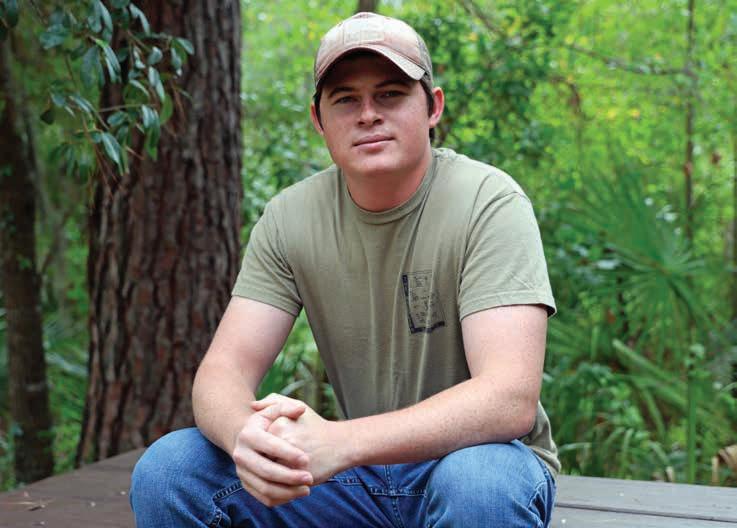
11, 2025.
This hunt looks different than the 2015 one because there are more limitations on the number of hunters, Hart said.
“I think a lot of emotions are being based on what happened in 2015,” he said.
Hart supports this hunt because of its timing, which is during female bear and cub hibernation. This reduces the likelihood of killing female bears or cubs — both of which were hunted in 2015, he said. Female bears and their cubs are vital for sustaining black bears’ populations.
Hart said the Florida black bear population increase is a conservation success. If biologists are correct in saying the number of bears in the state is increasing, he said, he’s in support of a limited hunt.
Reviews between hunters are mixed, Hart said. Some of his friends look forward to hunting a new species, while his other friends are excited by increased conservation funding brought in from applications. Some, he added, can’t see themselves personally shooting a bear.
Hart purchased two tickets for the hunt, even though he said doesn’t know if he can ever see himself shooting a bear. While he did not win the lottery, he said he’s interested in seeing if this hunt helps conserve the bear population.
“Hopefully, it’s run and managed better than 2015,” Hart said.
@sofiab026 sbravo@alligator.org



Monday-Friday: 8am-4:30pm Saturday: 9am-1pm







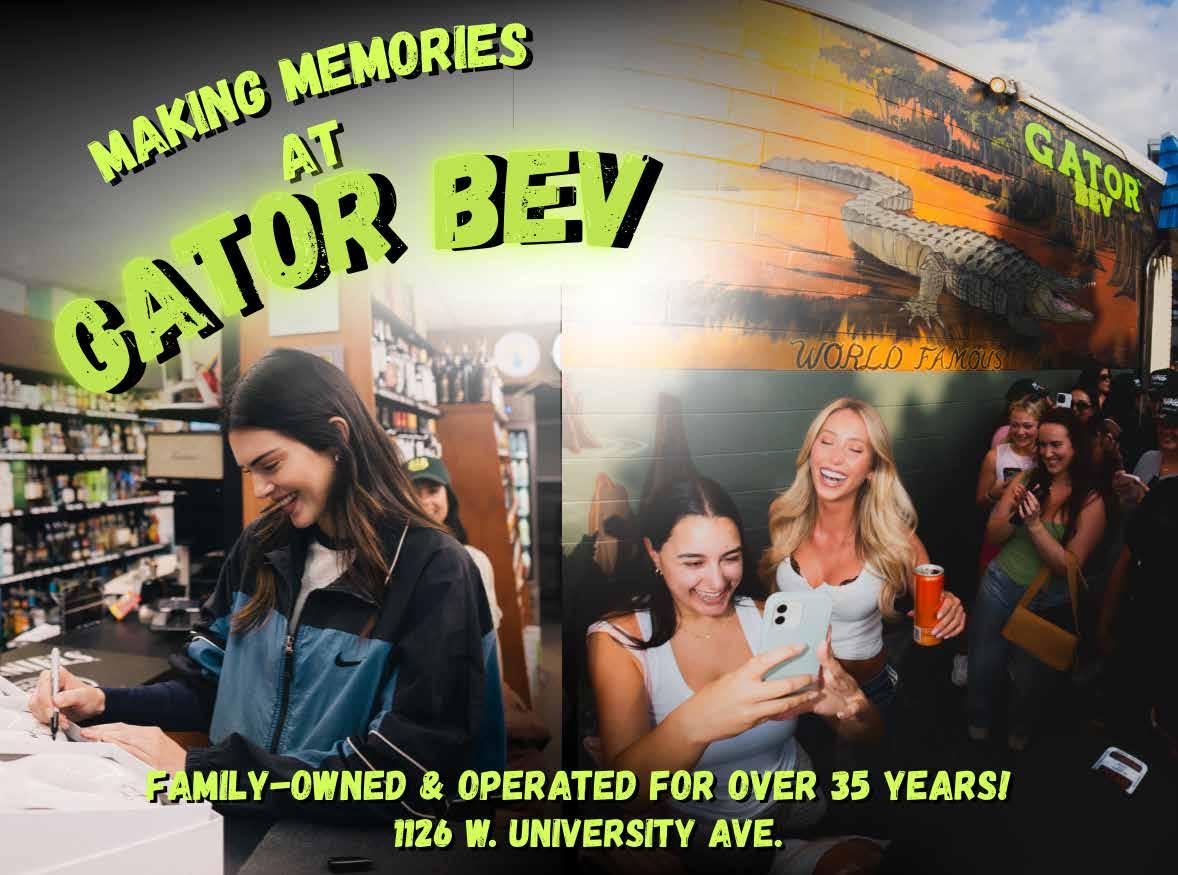
Libby Clifton // Alligator Staff Noah Hart sits on a picnic table at the Natural Area Teaching Lab on Saturday, Oct.
Adored ape leaves Santa Fe Zoo behind to start new family
THE
ZOO SAYS GOODBYE TO HOLMES, A WHITE-HANDED GIBBON EMPLOYEES DESCRIBED AS ‘KOOKY’
By Leona Masangkay Alligator Staff Writer
At 7 years old, Holmes — one of Santa Fe College Teaching Zoo’s white-handed gibbons — is swinging into a new chapter of his life.
The long-limbed ape left the teaching zoo Sept. 12 for a zoo accredited by the Association of Zoos and Aquariums. AZA-accreditation is a coveted status currently limited to about 250 zoos and aquariums around the world. That means Holmes will receive the highest standard of animal care as he meets an assigned mate to start a family of his own. Holmes’ new zoo has not been made public yet.
Holmes lived at the teaching zoo his entire life, according to Jade Woodling, the conservation and education curator at the zoo. As male gibbons grow older, she said, they become territorial and seek a mate to maintain their status at the top of the family hierarchy.
Holmes has reached the age where he is ready to become the head of his own family, which is why he is departing from the teaching zoo, she said.
Of all the gibbons at the Santa Fe zoo, Woodling said, Holmes was the kookiest. He’s small for an ape — fully grown males in his species
typically stand between 1.5 to 2 feet — with long limbs and a hairless face. He has dark fur except around his face, hands and feet, where his fur is white.
“He doesn’t do anything average,” she said. “If he’s going to swing across something, he’s going to flip while he does it.”
White-handed gibbons are an endangered species from Indonesia and the Malay Peninsula. While often mistaken for monkeys at first glance, gibbons do not have tails, so they fall under the ape family.
“When we have species like this, we want to create what’s called an ‘assurance population,’” Woodling said. “We would have this really healthy, genetic population to draw from.”
An assurance population guarantees a number of healthy gibbons are preserved in zoos in case the wild gibbon population continues to decline. Moving male gibbons to different zoos minimizes inbreeding by assigning mates to the gibbons that are not within their immediate family, she said.
In many other ape species, males assert dominance by having multiple female partners. But male gibbons mate for life and establish a tightknit family dynamic, Woodling said, where offspring learn how to groom and swing alongside each other.
Between playing and learning, Holmes and his siblings learned to take care of one another, Woodling said.
“It’s always fun to see all the siblings interacting with each other,” she
said. “You see a lot of play amongst the siblings. They try to get their parents in on it every once in a while.”
Preparing for the move
Holmes’ family extended past his parents and siblings — he also had a team of trainers that worked alongside him and watched him grow up.
Ryan Smith, a 22-year-old UF hospitality and tourism senior, was Holmes’ trainer in 2023. She got randomly assigned to specialize in gibbons at the zoo when she started there, and she said she wouldn’t have it any other way.
“We always would joke around that he was like the teenage frat guy that didn’t listen to the rules,” Smith said. “But he was honestly such a sweet boy.”
Holmes was the troublemaker son, she said, and he enjoyed being an instigator and swinging around the ropes of his habitat with his brother. Though sad to see Holmes go, Smith said she’s excited to see what lies ahead for the gibbon.
Gibbons are a protected contact species, Smith said, meaning for the safety of everyone involved, trainers and gibbons are never in the same room together due to the gibbons’ high levels of strength and intelligence.
During training sessions, trainers wait for gibbons to approach them before beginning the process through a mesh barrier. Gibbons can then “break the barrier,” Smith said, allowing trainers to make limited physical contact, often with the gibbons’ fingers or palms.
Training strengthens the connection between gibbons and trainers, which makes caring for the gibbons’ health and potential injuries easier, Smith said. For some exercises, trainers may call the gibbons to come over, ask to touch them or ask to see their palms, arms or other areas.
During some of these sessions, Smith helped Holmes get comfortable with his squeeze cage, which is a small crate used to make transportation, health checkups or vaccinations easier.
Squeeze cage training is a slow process, Smith said, as Holmes had to become comfortable with small spaces before she could move onto closing the pulley-operated door. The intelligent ape noticed as soon as Smith reached for the handle to close the door, and would sometimes immediately run away, she said.
“I was a trainer that he could trust,” Smith said. “I think that his resilience with it helped move the process so much faster.”
The big farewell Holmes’ transportation from the teaching zoo went smoothly, said Julia Sweet, a 24-year-old student in the Santa Fe Zoo Animal Technology program.
Sweet trains Holmes’ mom, Cajun, and she often observed Holmes’ relationship with his family during training sessions.
Toward the end of Holmes’ time at the teaching zoo, she said he began to “butt heads” with his father, Eddie. Conversely, Holmes has a good relationship with Cajun and knows his

A white-handed gibbon plays in its enclosure at the Santa Fe College Teaching Zoo in Gainesville on Saturday, Sept. 20, 2025.
mom’s limits, Sweet said.
Cusa and Onyx, his younger siblings, have already begun to act differently in their older brother’s absence.
The two play-fight often and have been doing so more since Holmes’ departure, Sweet said. Onyx, being the youngest, tends to “bounce all over the place,” while Cusa is a bit more mellow.
“Even though it’s super sad, and we already miss him a lot, it’s definitely what is best for him and also what’s best for the family,” Sweet said.
@leo_amasangkay masangkay@alligator.org
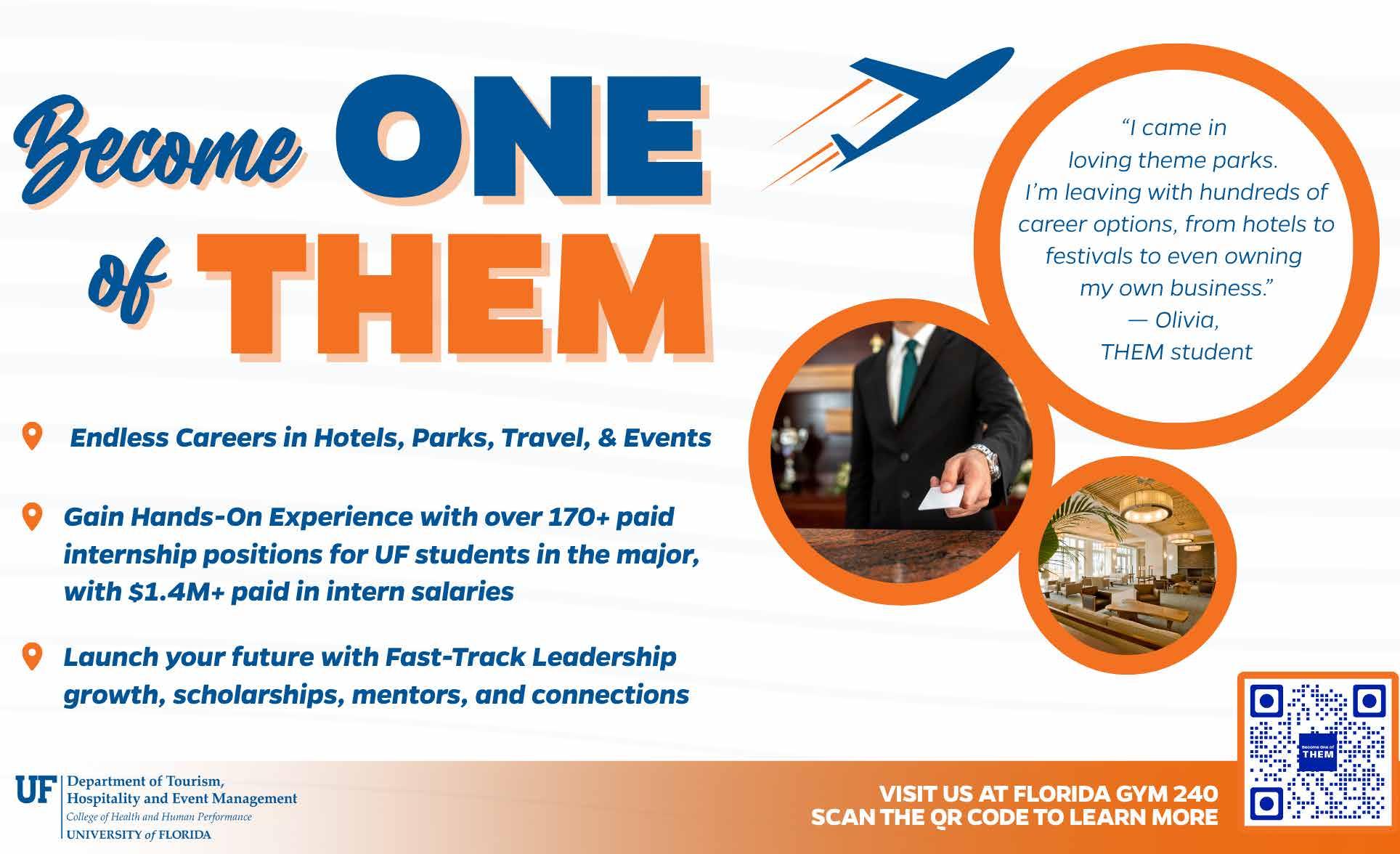
Morgan Waters // Alligator Staff
Florida is executing people in record numbers. Here’s what
THE STATE WILL CARRY OUT ITS RECORD-BREAKING 14TH EXECUTION OF THE YEAR
TUESDAY
By Alexa Ryan Alligator Staff Writer
Florida has put a record number of people to death this year, more than any other state in the country.
So far this year, the state has executed 13 people — a figure higher than any year since the U.S. Supreme Court reinstated the practice 50 years ago. The second-highest year for executions occurred in 2014, when the state executed eight people.
Florida residents make up just under 6% of the total U.S. population, but the state holds around 14% of the nation’s death row inmates, according to data from the U.S. Census Bureau and the Death Penalty Information Center.
Execution No. 14 is scheduled for Oct. 14.
While supporters of the death penalty argue it’s the only effective way to punish some crimes, opponents say the practice is cruel and expensive.
Since the state of Florida carried out its first execution in 1924, 315
people have been executed, only two of whom were women. The Supreme Court struck down the death penalty in 1972 for four years before bringing it back. After it was reinstated, Florida was the first state to resume executions.
The U.S. Supreme Court ruled in 2008 that, when it comes to crimes against individuals, the death penalty can only be used in cases of murder. But Gov. Ron DeSantis passed changes to Florida statutes in 2023 allowing its use in child sex abuse cases.
How the death penalty works
Electrocution was the main method of execution in Florida until the 1990s. In that decade, three electrocutions went awry, including two inmates catching on fire and a third bleeding from the nose while being electrocuted, according to the DPIC.
In 2000, the state began offering lethal injection as its new primary mode of execution. Lethal injection has a 7.2% chance of going awry, while electrocution has a little less than a 2% chance, according to DPIC.
DPIC Executive Director Robin Maher attributes the mistake rate to a lack of government transparency. It’s unclear where the state purchas-
es the drugs it uses to carry out lethal injections, as names of companies supplying the drugs can be exempt from public record.
“Transparency reduces the risk of a botched execution,” Maher said.
Just six months after Florida began using lethal injection, an execution was botched, with staff taking over 30 minutes to find a second vein for the injection. Another one went awry in 2006, but Florida still uses lethal injection as its main method of execution.
Currently, at least eight of 12 jurors must recommend a death sentence to the judge — a change from just two years ago, when the sentence required unanimous recommendation from the jury. This eight-person approval is the lowest threshold in the country, according to Maher.
Legislators and parents pushed for the change after Nikolas Cruz, who killed 17 people at Marjory Stoneman Douglas High School in 2018, avoided the death penalty after three jurors voted to spare him in 2022.
Florida and Alabama are the only two states in the country that don’t require unanimous jury agreement for capital cases. However, the jury must still unanimously agree on at
least one aggravating factor, or a circumstance in the case that warrants a higher punishment, including death or life imprisonment.
Following the sentencing phase, the case automatically goes to the Florida Supreme Court, which can reaffirm the death sentence or reverse it.
To overturn a death sentence, the convicted persons and their lawyers can submit appeals claiming trial errors or ineffective legal counsel. If those are denied, the person is executed.
In most other states, the courts are heavily involved in the signing of a death warrant, but in Florida, the governor has sole discretion of whether to sign.
However, the courts remain involved in Florida’s appeals process and must affirm the death sentence before the governor can consider it.
For the death penalty
A little over half of Americans support the death penalty for people convicted of murder, according to a 2024 Gallup poll.
Florida House Rep. Dean Black, a Republican, is part of that group, believing some crimes can only be effectively punished by death.
“It’s also a statement to society,”
Black said. “It says there are crimes that are so horrible that you can only atone for that with your life.”
Black said the 14th execution is positive and signals justice being pursued. Floridians should want every year to have this many executions, and people should want the quick execution of those convicted of capital crimes, he said.
The appeals process needs to be reformed to allow for a quicker execution process, Black added. The average amount of time someone spends on death row is about 22 years, according to DPIC.
“It is taking too long for people who are condemned to work through the process and for the executions to be handed out,” he said. “Justice delayed is justice denied.”
Against the death penalty
Meanwhile, Floridians for Alternatives to the Death Penalty is fighting for an end to the practice.
The alternative: life in prison without the possibility of parole.
Read the rest online at alligator.org.
@AlexaRyan_ aryan@alligator.org
Gainesville community braces for financial fallout from federal government shutdown
THE SHUTDOWN STARTED OCT. 1 AFTER CONGRESS FAILED TO PASS A FUNDING BILL
By Noah Lantor Alligator Staff Writer
The U.S. Capitol is 776 miles away from the closest spot on UF’s campus. Yet the effects from the government shutdown that began at 12 a.m. Oct. 1 were felt instantly by the community.
The government shut down because Congress couldn’t agree on a funding bill for government services. The last government shutdown lasted 35 days, from December 2018 to January 2019.
While UF researchers and Veterans Affairs workers worry what could happen if the shutdown persists, TSA and NASA employees have already begun working without pay.
Most UF students won’t feel effects immediately, as federal financial aid and student loan disbursement will continue as normal. But student aid, loans and veteran education funds could eventually be delayed.
Federally funded grants and research
During the shutdown, the U.S. Education Department will not issue new grants or renew existing projects, according to PBS, because most of its workers are considered non-essen-

tial and don’t work during government shutdowns.
The FAFSA will not be impacted, and students shouldn’t expect delays unless the Education Department says otherwise, according to CBS.
UF researchers who rely on federal funding will feel the effects first.
Stephanie Manrique, a 21-year-old UF biosystems engineering junior, participates in federally funded biochemical and chemical engineering research. She said new graduate students will be most affected, particularly those who are part of the Graduate Research Fellowship Program, an initiative by the National Science Foundation funding Ph.D. research.
“The shutdown will pause all review for that, and they will not be awarded that,” Manrique said, referring to the people receiving program funding.
Manrique said if funding is cut, it will ultimately delay undergraduate graduation and the start of postgraduate degrees for the program’s students.
In the 2025 fiscal year, UF spent over $1 billion in research, the most ever recorded for the university, according to a July 22 press release. Over $600 million of that funding was federally funded.
The shutdown, if extended, could halt federally funded UF research projects in the middle of the school year. Manrique said it could also cause students like herself to be rejected from doctoral or master’s programs.
“Without the new funding that they need, they’re not going to be able to take on new students,” Manrique said. “Those grants are what pays our stipends.”
Manrique said she thinks most federally sponsored projects that are underway will not face major interruptions at UF unless the shutdown is extended.
Cynthia Roldán, a UF spokesperson, said in an email Oct. 2 she was “not aware of any immediate impacts” to federally funded research projects, scholarships or financial aid.
Malcom Randall Veterans Affairs Medical Center
The Malcom Randall Veterans Affairs Medical Center in Gainesville is the largest hospital in the North Florida and South Georgia region of the VA system. Over 96% of its employees are considered essential and are required to work during the shutdown, according to its September 2025 contingency plan.
Tieresha Daniel, a 30-year-old information receptionist in the patient advocate office at the VA hospital, said the shutdown has not personally impacted her, but she is worried about what could come if it lasts longer than two weeks. She gets paid biweekly.
“I have bills, I have kids,” Daniel said. “I’m a single parent of four girls.”
The VA has more than 6,800 employees in its local service area, according to the department website.
“It’s going to be crazy,” Daniel said. “People probably losing their houses and their jobs.”
TSA, FAA and NASA
Unlike Daniel, who is still receiving pay, TSA and Federal Aviation Administration essential workers at Gainesville Regional Airport must work through the shutdown without pay. Striking TSA and FAA employees have historically created public pressure on Congress to end shutdowns due to airport slowdowns, according to CNN.
TSA is expected to have about 50,000 agents working unpaid during the shutdown, while the FAA is expected to have over 13,000 air traffic controllers in the same position, according to a Reuters report released three hours before the shutdown began.
Beyond Alachua County, NASA employees are among the most affected in Florida.
About 83% of NASA employees have been required to take furloughs, or mandatory, unpaid leaves of absence, due to the shutdown, according to Steve Shinn, the acting chief financial officer at NASA. As of 2021, NASA supported more than 38,000 jobs in Florida.
Representatives from NASA were unavailable for comment because of the shutdown.
The Senate and House are scheduled to resume session Oct. 14.
@noah_lantor nlantor@alligator.org


Female UF students use app to warn others about bad-acting men Alachua County ends interlibrary loans after federal funding cuts
kind of background check people.”
By Isis Snow Alligator Staff Writer
Christine Lund followed every rule — filed reports, went through Greek Life, then Title IX. Each time, she was brushed aside and even told to “look up the definition of sexual harassment,” she said.
When help reporting her harassment never came from administrators, she found a different kind of accountability on Tea — an app where women can warn each other about men they have interacted with.
The mobile platform allows women to anonymously share reviews and warnings about men they’ve met, using “green flags” and “red flags” to signal positive or negative behavior.
Its stated goal is “to give women the tools they need to date safely in a world that often overlooks their protection,” its mission statement says. But it’s also faced criticism for privacy concerns, lack of verification and potential for false accusations.
Lund, a 21-year-old UF economics junior, downloaded the app while living in a new state for the summer. She wanted to go on dates, but after experiencing harassment in Gainesville, she was worried for her safety.
“That’s obviously kind of dangerous for women, especially when you don’t have a community established in a certain location,” she said. “This sounds like it could help me
At first, she was nervous to post any pictures of men she’d had poor interactions with. But one day, she decided to see what would happen if she posted about a man she used to go out with. The post buzzed with reactions and comments validating her experience. Lund felt relieved.
“[It] provided some sense of closure, like, ‘OK, I’m not crazy,’” she said. “Everybody was kind of experiencing the same things as me.”
The Tea app has helped over 5.7 million women “make safer dating decisions,” the app reports, though the number of men anonymously posted there is unknown. On the Apple app store, Tea has a 4.5 out of 5 star review and is ranked No. 1 in lifestyle apps.
Gamal Fernandez, a 20-year-old UF biology junior, discovered he was on the Tea app when a friend searched his name. According to the app, he had three red flags, including claims that he was “D.L.,” which means secretly gay, and that he treated women like objects.
He was shocked to hear what women were saying about him. But when reflecting harder about what was posted about him, Fernandez took those critiques to heart.
“It did push me to self-reflect in some ways,” he said. “Hearing some uncomfortable truths was definitely beneficial.”
Read the rest online at alligator.org
@isis_snoww isnow@alligator.org
FLORIDA INTERLIBRARY LOAN SERVICE DISCONTINUED AFTER DECADES
By Grace Larson Alligator Staff Writer
After decades of operation, the Florida Library Delivery Service has shut down — and with it ends a long-lasting network between Florida libraries.
Alachua County discontinued its Interlibrary Loan service Sept. 30, the library district announced to cardholders via email. The program allowed patrons to check out books and other materials from libraries outside of their residential district.
“We are looking for alternative avenues to be able to meet our patrons’ needs,” the email said. “We are very sorry for any inconvenience caused by this loss of federal funding.”
The change follows an executive order President Donald Trump issued in March, which directed the Institute of Museum and Library Services, along with six other government entities, be dismantled. The executive order outlined its goal to reduce “elements of the federal bureaucracy that the president has determined are unnecessary.” The institute is the only federal entity dedicated to funding library services nationwide.
As a result, Florida’s Division of Library and Information Services now lacks the federal funding necessary to deliver books between library districts, Alachua County clarified on its website. Federal dollars make up about twothirds of Florida’s State Library and Statewide
Resource Sharing Program budget, coming in at about $1.5 million for the 2025 to 2026 fiscal year.
With the delivery service underpinning the canceled interlibrary loans, libraries across the state must find alternative shipping and funding options to continue offering the service, and many of them, including Alachua’s, have suspended loans.
The change is troubling, said William Furlong, manager of UF’s Architecture & Fine Arts Library.
“No library can have every resource,” he said. “The fact that so many libraries nationwide were willing to share their collections with each other really speaks to the mission of libraries to share information.”
Furlong, who worked for the Alachua County Library District for eight years, said the loan service helped the community stay informed.
The Alachua County Library District ranked eighth among Florida libraries and systems for the number of packages sent through the loan service for the first three quarters of this fiscal year, according to the state. The district received over 2,000 interlibrary packages between October 2024 and June 2025.
Whether
The library district may struggle to fill gaps in its collection without access to these outside materials, Furlong said. Rather than criticizing the library district, he hopes people focus on the federal budget cuts causing the change.
Read the rest online at alligator.org.

@graceellarson glarson@alligator.org

MONDAY, OCTOBER 13, 2025
www.alligator.org/section/the-avenue
First-ever Great Pumpkin Bash brings Gainesville families downtown to celebrate fall
LOCALS WELCOMED THE NEW SEASON AT THE CITY OF GAINESVILLE’S NEW FALL FESTIVAL
By Juliana DeFilippo Avenue Staff Writer
It was 6-year-old Dimitry Olsen’s turn at the high striker. Dressed in a Spider-Man T-shirt, he lifted the mallet, which was as tall as him, over his shoulder and swung down on the lever. As the weight floated toward the bell at the top of the tower, his dad cheered him on.
The father-son duo was making its way around the carnival games at the first annual Great Pumpkin Bash, hosted on Bo Diddley Plaza Saturday, Oct. 11. By the time they reached the high striker, they had already taken on Balloon Blast and the inflatable

Keep up with the Avenue on Twitter. Tweet us @TheFloridaAve.
corn maze at the center of the festival.
“We got lost, we got separated, but we did make it out alive, right, Dimitry?” 39-year-old Vincent Olsen said. Dimitry nodded, smiling up at his dad.
The Pumpkin Bash attracted about 200 visitors of all ages. Families walked around the plaza, pushing strollers and walking dogs. Vendors sold food, drinks and clothes, while tablers offered information about their organizations. The inaugural fall festival also featured face painting, a scavenger hunt and musical chairs with polka renditions of pop songs.
Planning the festival took over six months, said 58-year-old Carol Velasques Richardson, Gainesville’s cultural affairs manager. Her team realized that although it had scheduled Hispanic Heritage Month and Indigenous Peoples Month celebrations in October, and the Downtown Festival and Art Show in November, it had yet to plan and host a fallthemed event.
“We don’t have anything that’s just really the old-time nostalgia fall, where you play carnival games or have candy apples, and you just come together as a family,” Velasques Richardson said.
Velasques Richardson and her team quickly contacted vendors and sponsors for the event, which cost around $7,000. The games and decorations added to the price but ultimately proved “a good way for us to use public money,” she said.
The cultural affairs division conducts community surveys at its events to understand what residents want to see. People frequently request more activities for Gainesville youth, so Velasques Richardson set out to create a family event. She said seeing hundreds of people together at the festival, including kids of all ages playing games, felt magical.
“It makes me feel good about what we’re doing and that we’re giving the community what they want,” Velasques Richardson said.
Caimán Mes de la Herencia Hispana — Estudiantes demuestran logros . Lea más en la página 10.
For 36-year-old Gainesville resident Rose Ferry, the Pumpkin Bash perfectly combined two of her favorite things: her family and fall. She donned a jack-o’-lantern-patterned dress, while her husband, Robert, wore pumpkin-orange pants. Their children also came in Halloween-themed outfits, including an orange-and-black onesie for their daughter, October, named after Ferry’s favorite month.
In celebration of her favorite time of the year, Ferry said she attends as many fallthemed events as possible. She has loved introducing her children to seasonal traditions, like shopping for Halloween decor.
“I’ve waited my whole life to have a family, and now I have it,” she said. “It’s really sweet to get to do all the things that I love and bring them to all the things that I love, and they love it, too.”
@JulianaDeF58101
jdefillipo@alligator.org


Best friends trade law careers for lace at new bridal shop
GAINESVILLE’S THE FLEURIDIAN REFLECTS ITS OWNERS’ VISION FOR COMFORT, INCLUSIVITY AND STYLE
By Aaliyah Evertz Avenue Staff Writer
The inside of Gainesville’s newest bridal boutique feels more like a living room than a showroom. A fireplace anchors the space, patterned wallpapers add color and racks of gowns in every size line the walls.
The Fleuridian, which opened in late September, hosted an open house Oct. 9, featuring sugar cookies stamped with The Fleuridian’s logo, cupcakes iced with buttercream flowers, a scavenger hunt throughout the space and a bouquet-making activity for guests. Co-owners and longtime friends Kate Magill and Sloane Henry, who met at the UF Levin College of Law in 2017, organized the kickoff.
Magill, 35, built her career in law and politics in Washington, D.C., before moving back to Gainesville earlier this year.
Henry, 35, fell in love with the wedding
BAKERY 1908 BRINGS UNIQUE DISHES TO LOCAL SWEET — AND SAVORY — TREAT SCENE
By Christopher Rodriguez Avenue Staff Writer
Bakery 1908’s name comes from the lucky number 1908. But even luckier are the new customers of this Asian bakery as they walk away from the counter, their arms laden with handcrafted sweet buns and steaming coffees.
Located on the corner of Archer Road and Southwest 34th Street is the newest addition to Gainesville’s
industry while working French Quarter weddings in New Orleans, drawn to the artistry and collaboration of musicians, florists and planners. She later put herself through law school in Gainesville while working at David’s Bridal, then, while job-hunting in Washington, D.C., joined Anthropologie’s BHLDN. After four years practicing law, she returned to Gainesville ready for a new venture.
When Henry sent Magill a slideshow pitching a bridal boutique, the two realized they had the complementary skills to make it happen.
“She showed me the PowerPoint … and I was like, ‘Yeah, let’s do it. Everyone else is doing what they want, so let’s open up a bridal shop,’” Magill said.
Magill handles the business operations, while Henry oversees the creative side and gown selection. Together, they shaped the boutique around the idea of inclusivity and comfort.
Every designer at The Fleuridian offers gowns in sizes 0 to 32, and the shop keeps samples in multiple sizes so brides can accurately see how dresses will look.
“We don’t feel like you should have to go to a separate salon that is plus size,” Henry
pastry scene. Originally opened as Sweet Buns Bakery in Gainesville, the store moved to Orlando alongside its owners for a rebrand. Now, they’re back home.
said.
Inclusivity extends beyond sizing. The boutique offers jumpsuits and two-piece sets for brides who want alternatives to traditional gowns, creating a space that welcomes queer and gender-nonconforming clients as well, Henry said.
The Fleuridian differs from other boutiques by only hosting one bridal appointment at a time. Brides and their guests have the entire boutique to themselves during a fitting.
“She is the only bride in the store,” Henry said. “She’s the only person that matters during that … appointment.”
The shop’s designer lineup includes Tara LaTour, known for colorful and patterned gowns; Truvelle, with its botanical designs; Jenny Yoo and Watters, two of Henry’s favorites from her BHLDN days; and Iveary Bridal, a label known for sparkle and glamour.
The Fleuridian came together with help from family and friends, who assisted in renovating rooms, painting walls and installing mirrors. Henry’s younger sister, 32-year-old Leland Henry, manages the shop’s social media while working full time at the UF Foundation, the university’s fundraising and fund
management partner.
In addition to promoting the boutique online, Leland helps at bridal expos, shadows appointments and supports day-to-day needs at the shop. Her involvement has given her a front-row seat to the boutique’s early achievements.
“Selling our first dress was a big milestone,” she said. “You build it [this space], and you don’t know if anyone will come. … When they got that first sale, [it’s] like, OK, there is a need for this in town, and people are interested.”
The shop’s name also reflects its story. “Fleur” means flower in French, a reference to Sloane Henry’s years in New Orleans, where she first became involved in weddings. The name echoes “Floridian,” grounding the boutique in its home state.
The co-owners said their goal is to create a space where brides feel celebrated rather than pressured.
“I want them to feel comfortable and at home,” Magill said. “I don’t want them to feel like they’re being sold something.”
@aaliyahevertz1 aevertz@alligator.org



“I love how the college students are hanging out here and just doing their own group meetings, homework and stuff,” said general manager Verbena Ou. “I like the community we have in this location.”
Ou appreciates the college demographic the Gainesville location has attracted. Having such a young customer base has inspired new flavors for the bakery, including a croissant in the works modeled after the viral Dubai chocolate.
The bakery’s shelves are lined

with dozens of buns, pastries, breads and sandwiches, from the savory-sweet pork floss bun to the trendy flavors of a matcha basque cheesecake.
Catherine Valencia, a 22-yearold UF communication sciences and disorders senior, enjoys the sliced sausage bun, a quasi-hot dog bread with chicken sausages topped with cheese. Ethan Le prefers a sweeter option: the caterpillar bun, a soft bread filled with buttercream frosting.
“It’s awesome,” said Le, a 22-year-old UF digital arts and sciences graduate student. “It’s been a while since we’ve had a kind of Asian bakery like this.”
The magic of the bun, one of Bakery 1908’s signature treats, results from multiple hours of prep by bakers, who make everything fresh in-house.
Every night, bakers prepare and roll the dough, which rises in the cooler overnight. Then, at 6:30 a.m., the rolls are taken out of the fridge and baked before the 8 a.m. opening. Customers who pick up two buns before 10:30 a.m. get a free coffee or tea included in their purchase.
The bakery gives the same attention to the buns’ presentation as they do their taste. The store has its own interior designer, who manages the lighting and decor to give the
treats’ golden crusts an appetizing shine.
Mikel Lin, a 19-year-old UF aerospace and mechanical engineering sophomore and employee at Bakery 1908, appreciates the tight-knit community between himself and his coworkers. He’s been tasting each item on the menu thanks to his employee discount; his current favorite is the best-selling golden onion bun.
“It’s not like a strict, sterile corporate environment.” Lin said. “We’re just here to be here because we love being here.”
@ChrisRodri29386 crodriguez@alligator.org







El Caimán
With sticks and soul, UF field hockey player lives out her mom’s
CATALINA MENDEZ IS PRESIDENT OF UF CLUB FIELD HOCKEY
By Victoria Riccobono Alligator Staff Writer
Watching her mom play field hockey as a child, Catalina Mendez knew the sport would become her home.
Mendez, a 22-year-old UF business administration senior, has played field hockey recreationally since age 5. She started playing competitively at 12, which deepened her passion for the sport and its camaraderie, she said.
When she started competing at the U14 level, she joined Doral
Field Hockey in Doral, just west of Miami, which is advertised as the top field hockey destination in South Florida. During her time at the club, she continued to learn and improve her craft, traveling to competitions as far as Virginia and Delaware, and even playing in the Disney Field Hockey Showcase.
Her eagerness to improve herself and be open to various styles of coaching helped her stand out, said Gabriela Cappanera, Mendez’s coach and owner of Doral Field Hockey.
“When you have a player that is coachable, you know it's a player who is going to succeed,” she said.
Field hockey runs in Mendez’s blood. Her mother, Lujan Soler, played field hockey in Argentina for Colegio Labardén.
At 27 years old, Soler moved to the U.S. and continued to play field hockey, joining many other Argentine and South American players as the sport grew in Miami, Mendez said.
When Mendez left for college at UF, she knew she wanted to continue her mother’s legacy.
There, she found UF Club Field Hockey and merged her passion for the sport with her professional aspirations in the business world. Acting as secretary her sophomore year, co-president her junior year and president her senior year, she learned sports were more than just an activity — they were a stepping stone into opportunity.

“Sports really just gave me everything that I have now," Mendez said. “It opened my eyes
From Caracas to the cutting edge of medicine
UF BIOMEDICAL ENGINEERING AND PRE-MED STUDENT STRIVES TO MAKE HEALTH
CARE INCLUSIVE
By María José Cordero Contributing writer to The Alligator
The road to a dream is rarely smooth. But for José Peaguda, determination and hope have made the journey lighter — he’s driven by a lifelong calling to medicine and a deep desire to help others.
Peaguda is a 23-year-old UF biomedical

engineering senior and president of the Venezuelan Student Association. He grew up in Caracas, Venezuela, where his parents worked in the health care industry. Their dedication to the craft inspired him to follow a similar path.
At 15, his life changed dramatically when his family emigrated to Miami in 2018, leaving behind their careers to give Peaguda and his brother a better future.
“I deeply value their sacrifice,” he said of his parents, “and it motivates me to make the most of every chance I get.”
Adjusting to the U.S. education system was not easy. Peaguda faced rejections from schools and programs, including UF.
Mantente al día con El Caimán en Twitter. Envíanos un tweet @ElCaimanGNV.


and continuing to push them in a
said. “She was generous, she was talkative. She related very well to the players that had already a lot of experience, but she was always there to receive and welcome the new players.”
Although he received several rejections in tests and admissions, his determination did not waver. He eventually enrolled in The Honors College at Miami Dade College, a decision he called a turning point.
“I felt I needed that springboard because inside me was the certainty that I could do very well,” he said. “I wouldn’t be the person I am today without that opportunity.”
In Miami, his interests expanded beyond medicine. A research position in the University of Miami’s Sports Medicine lab, where he studied the effects of exercise on patients with Parkinson’s Disease, sparked his fascination with biomedical engineering.
When Peaguda transferred to UF, he set his sights on medical school — but also on research. At the UF Orthopaedic Biomedical Engineering Laboratory, he investigates the
For Mendez, field hockey is not only good exercise, but also a way to connect the masses. Read the rest online at


Opinions
Advice — Should my roommates take care of my cat? Read more on pg. 12.


























Founder of popular Gainesville run club calls his sport a ‘positive nuisance’
BENITO
ABBIATI IS GROWING A VIBRANT GROUP THROUGH
PACE GAINESVILLE
By Sofia Alamo Alligator Staff Writer
Benito Abbiati gets high every day.
“You feel a runner’s high,” he said. “There’s a certain high … without drugs.”
Abbiati was an athlete long before leading runs through Gainesville. Born in Argentina, he grew up playing soccer before immigrating to Puerto Rico at 5 years old. The 23-year-old UF sports management senior later moved to
the U.S., where he discovered a passion for rugby at Okapi Wanderers Rugby FC in Weston, Florida.
“Rugby was life-changing,” he said. “It taught me major sportsmanship, relaxing in situations in which you would never normally be relaxed.”
It was then, in high school, when he met
Juan Andres “Juancho” Lanz and Arnaldo Morales, the original minds behind Pace Project. The initiative started in Weston as a simple mass invite to join a unique run club — one that welcomes runners at every level to run at their own pace. It quickly became a supportive community through shared workouts and social connections.
Years later, when Abbiati arrived at UF, he longed for a similar community.
“There has to be a certain way to make it so that I’m not running alone constantly with just music,” he recalls thinking.
After discussing it with Juancho and Morales, Abbiati brought a new branch of the Pace Project to Gainesville. The start was rocky — not a single person showed up to the first meet.
A relentless athlete, Abbiati never gave up. Instead, he “just grinded it out slowly for an entire Spring semester,” he said.
His efforts finally saw fruition this semester, as the run club has grown at a rate Abbiati called “stupidly exponential.” Averaging about
a dozen runners per practice, Pace Gainesville is now a thriving community of people supporting each other’s fitness goals.
The group has grown bigger than Abbiati ever imagined, he said.
The group’s dedication has earned it collaborations with companies such as Redbull, which recently gifted sugar-free energy drinks to support their workouts.
Most importantly, Abbiati said he can already feel the group’s community impact.
Read the rest online at alligator.org. @alamosofiaa salamo@alligator.org
Isabella Castro speaks 4 languages. She’s not done learning just yet.
THE COLOMBIAN AMERICAN UF STUDENT USES LANGUAGE TO EFFECT CHANGE IN HER COMMUNITY
By Ariana Badra Alligator Staff Writer
Quadrilingual in Spanish, English, French and Russian, Isabella Castro’s truest fluency is in connection.
Castro, a 20-year-old UF international studies and dual languages junior with a concentration in Europe and specializations in French and Russian, has cultivated language versatility since childhood.
From annual trips to her parents’ hometown in Colombia to serving as their English translator in the U.S., Castro built connections across cultures while witnessing how language differences barred other Hispanic people, like her parents, from doing the same.
“It hurt me,” she said. “They weren’t able to fully say what they wanted to do, because there’s so much nuance in language.”
During high school, Castro also added French to her vocabulary and, throughout her time at UF, Russian — a language the university deems as critical. Critical languages are languages that are nationally valued, yet rarely spoken domestically and typically understudied by Americans.
Her path led her to the 2025 Critical Languages Scholarship, which sent her to Latvia for an immersive program that taught her how language ties into national security and global connection, she said.
In 2025, she also co-authored humanitarian research alongside Armin Langer, a UF European studies professor. Awarded as an Emerging Scholar, a merit-based scholarship granted to first- and second-year students interested in research with no prior experience, Castro’s research idea became the first ever selected by the Center for Latin American Studies.
Castro and Langer studied resistance in Latin American music, with a focus on the lyrics of rapper Recidente. They aimed to understand
Pan-Americanism, the movement of alliance across the Americas, alongside broader Latin American history.
“Isabella didn’t just comprehend the material,” Langer said. “She applied postcolonial theory and concepts of cultural imperialism to the lyrics with a sophistication that is rare in an undergraduate researcher.”
The Bob Graham Center also honored Castro as a Haskell Scholar, offering up to $3,000 in stipends for faculty research, which allowed her to analyze far-right politics in the 2024 European Parliament elections and colonial Peruvian history.
“She embodies this idea of, there is no harm in applying for everything and anything,” said Corinne Tomasi, academic program coordinator
for the Center of European Studies. Castro has a drive for “looking for the opportunities and not waiting for them to come to her,” Tomasi added.
Even in her spare time, Castro spreads her knowledge in the community. She has taught weekly English lessons for local immigrants during her time as an intern for the Latino Women’s League, a nonprofit organization committed to preserving Latin culture and arts in Gainesville.
Read the rest online at alligator.org.
@arianavbm abadra@alligator.org










I have a cat and live with a few roommates who love to hang out with my cat and benefit from her company. My cat is (rightly) 100% my responsibility, from feeding and cleaning the litter box to vet bills and toys. The only thing my roommates do is feed my cat on the rare occasion I’m gone for a weekend, which I always ask well in advance and am very grateful for. I don’t even ask them to scoop the litter box. Less than once a month, my cat makes a small mess (hairball, knocking over the trash) in the common area when I’m in class or at work. Instead of occasionally taking a few minutes to clean it up, my roommates will text me about it and leave the mess until I can get home, often hours later. I absolutely wouldn’t expect them to clean a mess my cat leaves in my room, but a mess in the common area every once in a blue moon feels like something they could just wipe up quickly. It’s not like it happens frequently, and it feels petty when we all chip in to keep the common area clean. Am I overreacting to think they could be less individualistic once in a while?
Signed, Cat Caretaker
The views expressed here are not necessarily those of The Alligator.




Before I sat down to write a response to your question, we gave my roommate’s cat her dewormer as she tried to jump out of our arms. A little earlier, I came home from working a shift at an animal clinic. I have seen all types of human and animal relationships in my lifetime. From owner and pet to researcher and subject, our interactions with animals have an impact on our reality.
Life becomes a bit heavier with the responsibility of a pet, even when they make our lives better. Sometimes, we need some help to shoulder that responsibility, especially when we are stretched thin. My roommate has a cat we all love and help care for. This is help we offer because we love our roommate and we love her cat, Ginger, as our own. This is not to say your roommates are obligated to have a similar agreement, but this shapes my perspective on your situation.
I do not find it unreasonable for you to be frustrated with your roommates’ lack of initiative. It’s disheartening when someone’s actions are inconsistent with their other behavior. They might not even be thinking about it when they leave the


mess for you to clean up. They are focusing on your responsibility for your cat over the shared responsibility of the space. When they leave the mess sitting there, they allow a common area to stay dirty.
Read the rest online at alligator.org/section/opinions.
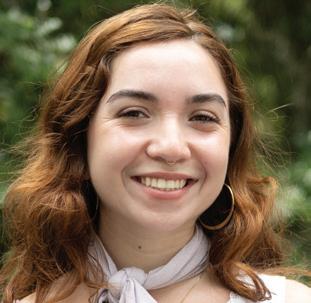
Alejandra Agustin opinions@alligator.org
Send questions to opinions@alligator.org. Please include your name, age — and if you are a student — your major and year, even if you wish to remain anonymous. We can keep identifying information private. Questions may be edited for clarity in publication.
Alejandra Agustin is a 21-year-old UF English and anthropology senior.



Los Angeles Times Daily Crossword Puzzle
How to Place a Classified Ad:
Rooms 4 rent – fully furnished! Micanopy 19min to UF, on 3 acres All utilities included + WiFi $750/mo – $500 security deposit Next Door Realty & Property Mgmt Call or text 352-512-4639 today 10-20-25-5-1
APARTMENT FOR RENT - Furnished 1BR/ 2nd floor, heat/air not central. 10 Minutes to campus 409 SE 14th Pl. Asking $900. Grad students preferred. No drinking, drugs, smoking, pets. 55 & Older. 352-213-5942 10-20-25-3-1
We Buy Houses for Cash AS-IS! No repairs. No fuss. Any condition. Easy process: Call, get cash offer and get paid. Call today for your fair cash offer: 1-321-603-3026 1013-2-5
When the heat is on and it's bucks that you need, Best Jewelry and Loan your requests we will heed. 523
392-0370 12-1-25-15-10
Donate your vehicle to help find missing kids and keep kids safe. Fast free pickup, running or not, 24 hr. response. No emission test required, maximum tax deduction. Support Find the Children Call – Call 1-833-546-7050
The surf's up at "Pawn Beach". We're all making the scene. If you're in need go see Rich, Best Jewelry and Loan's got the "green" 523 NW 3rd Ave 352-371-4367 12-1-15-6 Planning to liquidate stereos,
Attention Cadillac, Buick, Chevy & GM Lease Holders: would you like to exit your lease early (for any reason)? —and maybe even get a check back for equity! Learn more: (941) 899-0900 24hr recorded message 10-13-1-12
EYES UP. PHONE DOWN. DON'T TEXT & DRIVE.
CASH PAID FOR HIGH-END MEN'S SPORT WATCHES. Rolex, Breitling, Omega, Patek Philippe, Heuer, Daytona, GMT, Submariner and Speedmaster. These brands only! Call for a quote: 1-833-641-0211 10-13-24-13 We Buy Vintage Guitars! Looking for 19201980 Gibson, Martin, Fender, Gretsch, Epiphone, Guild, Mosrite, Rickenbacker, Prairie State, D'Angelico, Stromberg. And Gibson Mandolins / Banjos. These brands only! Call for a quote: 1-833-641-6789 10-13-38-13
CONTENT CREATOR WANTED for Real Estate Office - This job would include photographing and videoing agents and homes to create social media content and ads. Pay based on experience and value. text 386-590-1373 with interest and qualifications. 10-20-25-3-14
15 Services
Ave 352-371-4367 12-1-15-15
● Affordable RV Camping Near Campus! ● Convenient location just minutes from UF. Safe, quiet, perfect for game day weekends. Water, electric, and Wi-Fi. Reserve your spot today! 352-372-1026 katesfishcamp.com Book Early - Limited Spots! 12-1-25-15-15
BATH & SHOWER UPDATES in as little as ONE DAY! Affordable prices - No payments for 18 months! Lifetime warranty & professional installs. Senior & Military Discounts available. Call: 1-833-754-2465 10-13-77-15
These Might be the Bible Answers you've been Looking for !!! www.MusingsAboutGod.com Logical, Clear, Respectful......ahhhh......... but a little Different ... 10-20-25-12-20
Need CPR Training?
(352) 727-4733 www.GatorCPR.com CNA Prep Classes from GatorCNA.com 12-1-25-15-16
ATTENTION OXYGEN THERAPY USERS! Discover Oxygen Therapy That Moves with You with Inogen Portable Oxygen Concentrators. FREE information kit. Call 1-833-661-3729 10-13-107-16 DRUG PROBLEM? WE CAN HELP! 24 HOURS 7 DAYS CALL NARCOTICS ANONYMOUS 352-376-8008 www.uncoastna.org pr@uncoastna.org
HIV ANTIBODY TESTING
Alachua County Health Dept. Call 334-7960 for app’t (optional $20 fee)
LOST MY VISK & BIRDIE If found do not approach or attempt to apprehend. Do not make eye contact or sudden movements. From a safe distance yell, zihuatanejo! 10-13-1-24
Submit your ad today! www.alligator.org/classifieds


SUBMIT YOUR AD TO ONE OF THE FOLLOWING CATEGORIES TODAY!
District 2 – North Florida
Al-Anon Family Groups
Help for the family and friends of alcoholics Find a local Al-Anon Meeting at our website: alanonfla2.org 8-21-3-16
Attention: VIAGRA and CIALIS USERS! A cheaper alternative to high drugstore prices! 50 Pill Special - Only $99! 100% guaranteed. CALL NOW: 1-877-349-1243 10-13-6-16 STOP OVERPAYING FOR HEALTH INSURANCE! Reduce premiums and out-ofpocket costs while getting the coverage you need! Call now for a competitive free quote. 1-877-351-3442. Plus... Income based government subsidies are available for those that qualify! 10-13-6-16
Make money while breathing. College Brain Fog? Try our Audio Breathwork. Relieve stress, gain abundance, mental clarity. Ambassadors needed. www.brainbreathes.com 10-13-25-4-20
1. GEOGRAPHY: Which U.S. state is the only one that borders on two oceans?
2. LITERATURE: Which famous author used the pseudonym Richard Bachman early in his career?
3. ANIMAL KINGDOM: What is the national animal of France?
4. MATH: What is the sum of the interior angles in a triangle?
5. HISTORY: Who was the first American president to win a Nobel Peace Prize?
6. GENERAL KNOWLEDGE: Which ancient civilization built Machu Picchu?
7. ACRONYMS: What does the computing acronym API stand for?
8. MOVIES: What is the name of Elle Woods' Chihuahua in "Legally Blonde"?
Trivia Test Sports Quiz
1. What NASCAR driver competed in 560 races from 1963-88 but never took the checkered flag despite having 103 finishes in the top 10?
2. Doug Easton, who founded Easton Archery in 1953, pioneered the use of what metal in sports equipment?
3. Name the Australian golfer who beat Fred Couples by three strokes to win his only major at the 1990 PGA Championship.
4. How many events are in the ultra-combined athletics competition known as the icosathlon?
5. Filipino flyweight boxing champion Francisco Villaruel Guilledo (1901-25) was better known by what name? (Hint: He shares it with a Mexican revolutionary.)
6. What American Greco-Roman wrestler won a gold medal at the 1984 Los Angeles Summer Olympics and was later instrumental in the growth of Ultimate Fighting Championship?
ScrabbleGrams solution
Buddy Arrington.
Aluminum.
Wayne Grady.
Pancho Villa.
Jeff Blatnick.
Stephen King.
MONDAY, OCTOBER 13, 2025
www.alligator.org/section/sports
FOOTBALL
DJ Lagway, Florida offense falter against ferocious Texas A&M defense
UF WENT 1-11 ON THIRD DOWN IN THE LOSS
By Max Bernstein Sports Writer
Following its 29-21 victory over then-No. 9 Texas on Oct. 4, the Gators offense didn’t skip a beat in the first quarter on Oct. 11.
On its opening drive against then-No. 5 Texas A&M, Florida marched 75 yards down the field in under four minutes, with sophomore quarterback DJ Lagway going 6-for-6 while completing passes to five different receivers, eventually finding freshman tight end Amir Jackson for a touchdown. Later in the quarter, the Gators once again pieced together another 75-yard scoring drive, this time on just six plays.
With the score even at 14 apiece after the opening quarter, it was clear the Gators’ offense would need to continue firing on all cylinders if it were to capture Billy Napier’s first ranked road victory at UF.
But that would not be the case.
After starting 10-for-12, Lagway completed only 11 of his 25 passing attempts over the next three quarters. Of UF’s 319 total yards, about half yards came in the first quarter of its 34-17 loss to the Aggies.
“My biggest thing is [to] start fast, stay con-
sistent and finish strong,” Lagway said. “[We] started fast, we weren’t consistent and we didn’t finish strong, so we got a lot of things that we can clean up as an offensive group.”
Lagway was under duress all evening. The Texas A&M defensive front consistently pushed past Florida’s veteran offensive line, especially on the left side against senior offensive tackle Austin Barber. The preseason All-SEC left tackle recorded a 30.0 Pro Football Focus grade in the matchup, including a 0.0 pass blocking grade.
Barber was matched up against redshirt senior Cashius Howell, one of the nation’s premier pass-rush specialists and the Southeastern Conference sack leader thus far in 2025. The leader of the Texas A&M defense recorded a sack, two quarterback hurries and a pass deflection.
Overall, Lagway was sacked three times. He also fumbled twice, losing the ball to Texas A&M’s senior defensive end Dayon Hayes on a game-sealing strip sack late in the fourth quarter. The Aggies recorded 12 pressures in the contest, per PFF.
“Defense steps up and starts making a bunch of plays,” Texas A&M head coach Mike Elko said. “I challenged the guys at halftime on defense to go out and get us two turnovers. … And we were able to go out there and cause two fumbles and recover them both.”
The Gators’ third-down struggles were ap-
Freshman edge rusher stands out as ‘freak athlete’ among Gators’ defense
AMONG A SPOTTY DEFENSE, FRESHMAN JAYDEN WOODS HAS BEEN ONE OF THE FEW CONSTANTS
By Luke Adragna Sports Writer
Florida’s freshman class is loaded with talent. Wide receivers Dallas Wilson and Vernell Brown III have gained attention for their offensive impact. On defense, freshman edge rusher Jayden Woods has been just as significant. He’s played the most snaps of any defensive lineman on Florida’s roster, and he’s tied for the most sacks (1.5) and is fourth in pressures (7) on the team.
“That kid is a freak athlete,” said Gators redshirt senior edge rusher Tyreak Sapp Sept. 10. “The kid doesn’t even know his own strength yet, it's crazy. The things I see him do just off raw talent, I can just imagine when his football playing ability goes up and his football IQ goes up.”
Woods began to receive attention throughout the Gators’ spring and fall camps. Head coach Billy Napier said “he’s exactly what we’re looking for” and was one of his favorites

in the Gators’ 2024 class. Woods made his debut against Long Island in Florida’s opener but didn’t record a tackle or sack.
In the following game, the Shawnee, Kansas, native tallied two tackles against South Florida. Two weeks later, Woods made his first start against then-No. 5 Miami, where he logged his first career sack.
“He's getting into a rhythm,” Napier said Oct. 8. “For a rookie, the season is chaos in the beginning. … He's handled it well. He's a focused young man.”
Woods' emergence has been vital to Florida’s defensive line, which has dealt with key players rotating in and out — forcing reliance on a group that wasn’t expected to make much of an impact early on in the season.
For instance, Gators star defensive tackle Caleb Banks, a redshirt senior, has been plagued by injuries throughout the year, playing just one half against Louisiana State Sept. 13.
Read the rest online at alligator.org/ section/sports.
@lukeadrag ladragna@alligator.org
parent all evening. UF converted once on 11 third down tries, its second-worst conversion rate of the season. The Gators failed to convert a single third-down conversion on 13 attempts in their loss to Miami Sept. 20.
"We were inefficient on first and second down,” Napier said. “Then you are playing third and long, and Mike [Elko] does a great job with his third down package. … In general, it's all about first and second down efficiency and we got to stay out of the third and longs."
Consistently playing behind the sticks and on the scoreboard, Lagway was forced to look downfield to keep UF within striking distance. That, however, would have major consequences for the sophomore quarterback.
On multiple occasions, Lagway held onto the ball for an extended period of time, allowing the Aggies’ defense to make plays. Texas A&M deflected five of Lagway’s passes.
Texas A&M also blanketed Florida’s premier target, freshman wide receiver Dallas Wilson. While the dynamic freshman wide receiver scored his third touchdown in two games in the first quarter, he was held without a catch after the 10-minute mark of the second quarter. Overall, he finished with three grabs for 20 yards on eight total targets.
Lagway’s favored target on the night was wide receiver Vernell Brown III, who recorded six receptions for a team-high 77 yards. The
freshman’s 31-yard catch in the late first quarter was UF’s longest play of the game and set the Gators up on their second and ultimate touchdown drive. Brown, however, fumbled and lost possession for UF in the third quarter, which allowed the Aggies to extend their lead to two possessions.
With Lagway and the passing game out of sync, the Gators looked to establish their run game — but to no avail. On 24 rushing attempts, UF only gained 74 yards, barely scratching three yards per carry.
UF’s ineffectiveness on the ground, paired with consistent pressure against the pass, kept the Gators’ offense in check and allowed the Aggies to assert their dominance.
“We weren’t able to run it effectively,” Napier said. “And then obviously at times when we did throw it, they were able to get pressure.”
UF’s offensive struggles have persisted halfway through the 2025 season. In six games, the Gators have averaged 22.3 points per game, which is tied for the lowest mark in the SEC and the worst of the Napier era by nearly a touchdown.
“I'm frustrated,” Lagway said. “This ain't acceptable, I'm tired of it. This ain't our brand of football. It's not what we're coached to do.” @maxbernstein23 mbernstein@alligator.org
alligatorSports has a podcast! The alligatorSports Podcast releases episodes every Wednesday and can be streamed on Spotify, Apple Podcasts or your other preferred streaming platform.
Follow our newsletter Love alligatorSports? Stay up to date on our content by following our newsletter. Scan the QR Code to sign up.

Follow us for updates For updates on UF athletics, follow us on Twitter at @alligatorSports or online at www.alligator.org/section/sports.
After a chaotic basketball season, Urban Klavzar looks
HE SPENT HIS FIRST FULL SUMMER IN GAINESVILLE FOLLOWING LAST SEASON’S REGISTRATION ISSUES
By Jeffrey Serber Sports Writer
Last year didn’t go according to plan for 6-foot-1 Florida guard Urban Klavzar.
Klavzar, 21, arrived in Florida expecting to make an immediate impact on the court. However, because he made money playing basketball overseas, he encountered eligibility issues with the NCAA.
The Slovenian native played overseas in Spain for Real Madrid during the 2021-22 season and Universidad Católica de Murcia Club de Baloncesto the following season. He scored 10 points in 23 minutes in his lone game for Real Madrid.
And, during the summer of 2024, he represented his country at the U20 EuroBasket competition, averaging 16.1 points per game and shooting 38% from three.
But when the 2024-25 season started, head coach Todd Golden was unable to play the team’s newest member.
Prior to July 1, the NCAA prevented players from participating in collegiate athletics if they have been paid to compete in that sport beforehand. Because Klavzar was paid for his time overseas, the NCAA did not clear him to play right away.
Game after game, questions lingered about whether Klavzar would play for UF at all. He missed Florida's first three games of
the 2024-25 season while the team was waiting for the NCAA to clear him to play. Later, Klavzar was forced to declare sophomore status, rather than freshman status, losing a year of eligibility.
Once he appeared on the court, Klavzar struggled to hit three-pointers. But as the season progressed, he found his stride.
Now, entering his second season, Klavzar looks to take advantage of his first full season with the team. He is expected to be one of the top scoring options off the bench for the Gators this year.
"I definitely feel more comfortable because I know the environment,” Klavzar said.
International experience to college play
When head coach Todd Golden and his staff signed Klavzar, they brought in a player with different experience than a typical transfer or high school recruit.
"He's not a guy that's coming out of the high school ranks bright-eyed and bushytailed,” Golden said. “He's played in big-time environments. He's played international basketball at the highest level, so I think he will be ready to help us right away.”
During Klavzar’s first game as a Gator, he played five minutes against FSU on Nov. 15, 2024, converting his lone field goal attempt.
Despite the relief of being cleared, it took a while before Klavzar fully transitioned into Florida’s style of play and began to make an impact. He missed 12 of his first 13 attempts from beyond the arc while struggling to find time on the court.
"The players were really athletic compared to where I played last year’s," he said. “And
of course, the players who got drafted were really, really talented.”
However, Klavzar got his chance once conference play began. After starting guards Walter Clayton Jr. and Alijah Martin sustained injuries, Klavzar had his best stretch of performances. During one game against Oklahoma, he played 23 minutes and made two of his four attempted threes, finishing the contest with 10 points — his highest as a sophomore.
When the two senior guards returned, Klavzar still played a key role, coming off the bench to hit shots from deep. In Florida's upset win at No. 1 Auburn, Klavzar made all three of his three-pointers, including two in the span of 13 seconds.
However, Klavzar played limited time the rest of the season because he struggled to create his own shots at the same level as other off-the-bench guards, like Denzel Aberdeen. At 6-foot-1-inch tall, the guard also lacked on the defensive end, especially in terms of his physicality.
As a result, he didn’t see the court when the Gators reached the Final Four. And before that, he had just two minutes in the Sweet 16 matchup against UConn and only three minutes against Maryland in the Elite Eight.
Embracing his first full season
Learning from a distance, Klavzar enters this season understanding what’s required for a consecutive national championship.
"We know we're the champs, but we got to look after each game individually," he said. "We lost a lot of talent, of course, in guard play, but that's why we got to step up now."
Klavzar said he's focused on his physicality this season. His smaller frame was one of the key reasons he struggled for minutes during his first year with the program.
However, going against Florida guard Boogie Fland — whom senior center Micah Handlogten called "a defensive menace" — and Xaivian Lee, Klavzar has improved.
"I got a lot of pounds up, and I think I'm trying to get better defensively," he said. "I know how physical our conference is, especially the guards are really physical and fast, so you got to be ready."
Besides spending time in the weight room, Klavzar has been a mentor for younger players on the team.
Klavzar spent the summer rooming in a dorm with the two freshman guards, Alex Lloyd and CJ Ingram. He said this created a bond and helped the newcomers acclimate to college life.
"At the start, they were really quiet, but now, now we talk more and more every day," Klavzar said. "I just feel like they're like everybody here, so they don't really feel like they're freshmen."
As the Gators prepare to open their season in Las Vegas against Arizona on Nov. 3, Klavzar's teammates said they've been impressed with his work in practice.
"He's gotten so much better," senior center Handlogten said. "He showed flashes of it at the game at Auburn, showing up and hitting those clutch shots; but I think he's just working to build on it this year."
@JeffreySerber Jserber@alligator.org
*Anyone who is attending, competing, postering or presenting at AI Days, October 27-29, needs to register. We look forward to seeing you. For college-specific AI events on October 24, check with your college.

